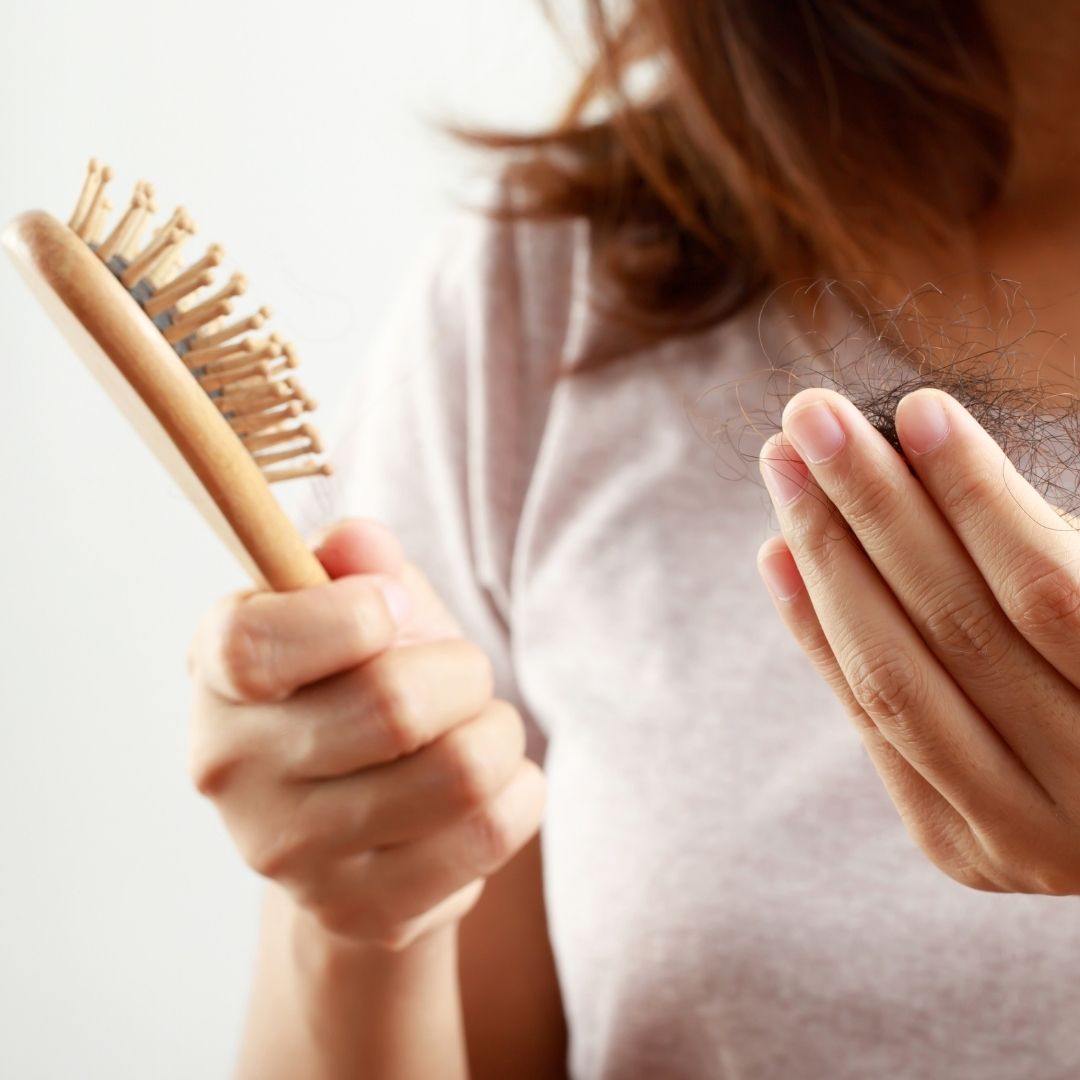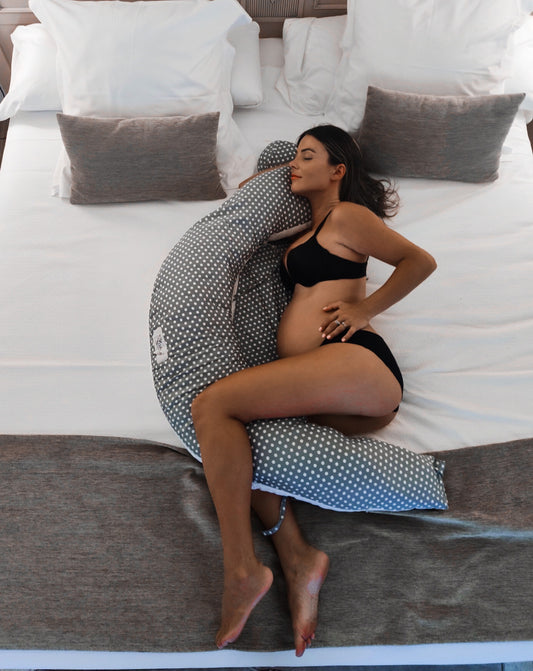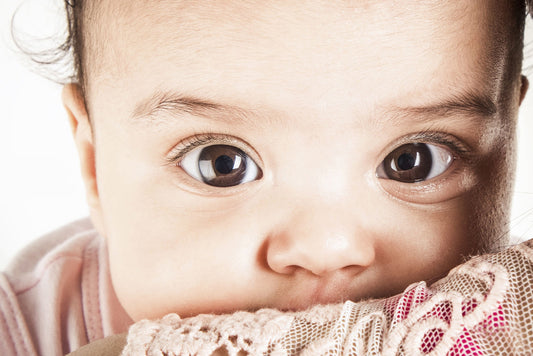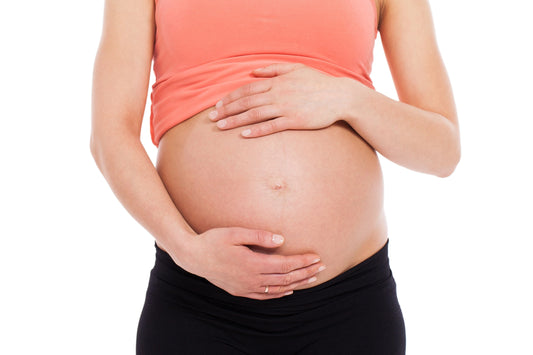Hair loss while breastfeeding and during pregnancy is a major concern of many mums-to-be. However, when pregnant you may find the opposite is true for you: you have super shiny healthy hair! Postpartum hair loss is very common and entirely physiological.
If you think about it, it's completely normal: our hair is always a good indicator of the state of our health, and it can become thicker or drier depending on what's going on inside our bodies... so it makes sense that it is also affected by pregnancy!
Let's take a closer look at how it changes, both before and after the arrival of a baby.
Hair health during pregnancy
If you're worried about your hair falling out, you can relax as most pregnant women experience the opposite when expecting a baby. Yes, that's right: it’s more likely your hair will be shinier and thicker.
This is due to the fact that hair growth is influenced by hormones, in particular oestrogen - which your body releases in abundance during pregnancy - and prostacyclin, which is produced by the placenta. These two substances lengthen the "Anagen" phase, i.e., the stage in which hair develops and grows, making it shinier, stronger, and more voluminous.
Some mums-to-be experience greasy hair during pregnancy, but this only usually occurs during the first few months. If your hair feels greasier than usual, refrain from washing it more frequently or using harsh shampoos, it’s best to stick with natural products.
What about grey hair? It is best to avoid dyes containing ammonia and, if you really feel you can’t go without colouring your hair while pregnant, then opt for a milder colour shampoo. You should always consult an expert - a gynaecologist, GP, or pharmacist - before using any type of product during pregnancy.
Although hair loss during pregnancy is much less common than complaints such as backache or swelling of the hands and feet, it can indeed happen. If it happens to you, don't worry it can be treated in the same way it would if you were breastfeeding... we’ll share how exactly in just a moment!
Hair loss while breastfeeding - all you need to know
Hair loss while breastfeeding is much more common than during pregnancy. In fact, it almost always happens! It is often associated directly with breastfeeding; however, it is actually linked to postpartum hormonal swings (so much so that it is scientifically referred to as "effluvium post-partum").
While oestrogen and prostacyclin return to normal levels, production of prolactin - especially if you are breastfeeding - and testosterone increase during this period. All this has an impact on the "Telogen" phase, which is the last stage in a hair's life cycle before it falls out. We usually lose around 100 hairs per day, but during the first few months after childbirth the amount increases greatly: after all, all that new hair which has grown during pregnancy has to fall out some time. When you add in the extreme fatigue and stress, which come hand in hand with being a new mum, then it’s easy to understand how hair loss whilst breastfeeding is almost inevitable.
Furthermore, the overall appearance of your hair often worsens after childbirth: it may become greasier, brittle and you may also notice a little dandruff. This is all caused by testosterone, which stimulates the functioning of the glands responsible for regulating sebum.
You needn’t worry, however, as these problems almost always go away on their own. When? And what can you do in the meantime? Read on to find out.
Can you dye your hair whilst breastfeeding?
This is the question on the lips of many new-mums, desperate to colour their hair after 9 months of waiting. If you're one of them, we're sorry to tell you that it's best to avoid not only colouring your hair when breastfeeding, but also - above all – any harsh hair treatments such as perming.
The chemicals used - ammonia, nickel, resorcinol, etc. - are harmful and, even in small quantities, could be ingested by an infant through their mum's milk. Not to also mention the fact that if you are allergic to them, they may cause abnormal reactions in your body as it recovers from childbirth.
If you feel you really need to dye your hair, go for natural colourants such as pure henna while breastfeeding. However, be careful: ask your pharmacist or herbalist to recommend a product which doesn’t contain any harmful additives.
Is there a hair supplement I can take whilst breastfeeding?
Although normally physiological, hair loss whilst breastfeeding - or postpartum hair loss - can also indicate nutritional deficiency. If you think this might be the case, consult your doctor and avoid self-diagnosing yourself.
Your doctor will be able to perform tests and advise on possible mineral-based supplements - such as silica or zinc - or vitamins - such as B8 (so-called biotin).
Hair loss whilst breastfeeding: how long does it last?
As we said before, any hair loss when breastfeeding is temporary. It peaks during the first three months after the birth and usually resolves spontaneously within a year.
If, however, it continues longer than this, we advise you to consult your doctor, who will most probably run tests to check hormonal values in your blood.
Breastfeeding hair loss: the most effective remedies
There are many different remedies to combat hair loss during breastfeeding: none of them are considered 100% effective (given the physical underlying cause) but they will help minimise the effects.
Here's what you can do:
- Eat foods rich in vitamins (fruit and vegetables), minerals (dried fruit, pulses, meat, dairy products, eggs), fatty acids (extra virgin olive oil, oily fish) and antioxidants (turmeric, ginger, red fruits).
- Wash your hair using mild products and let it air dry, without using a hair dryer or straightener.
- Don't wash your hair too often and don't tie it up in a tight bun.
- Apply a castor oil pack on your scalp overnight.
- Massage your scalp for about ten minutes a day to stimulate microcirculation.
Avoid taking supplements of any kind without consulting your doctor or pharmacist first: it’s best not to take any risks when breastfeeding!
Now you know everything about breastfeeding hair loss, you can sit back and enjoy your pregnancy, ready to embark on your new adventure of motherhood. Koala Babycare wishes you all the best!








